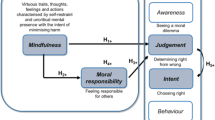Abstract
In this paper, I will critique Paul Draper’s recent model of God’s motivational structure, according to which God can make hard choices. I will argue that this model illegitimately treats value in a purely teleological way, as something to be promoted. Following T.M. Scanlon’s work on value theory, when we consider the fact that value is to be respected rather than merely promoted, this realization will significantly foreclose on the possible cases in which hard choices can conceivably be made by God. Most importantly, I challenge the idea that God can face hard choices between aesthetic and moral value in the way Draper suggests.
Similar content being viewed by others
Notes
One problem that needs to be taken seriously is whether this argument properly takes into account our epistemic situation in such cases. For example, it may be that we are mistaking the motivational force that each option provides for us to choose it with its objective value. In the case of God, it could be argued, there would be no mistake if there really is a difference in value between the options, whereas the same cannot be said of humans.
I will later point out that Swinburne’s model can partially address this objection, whereas Draper’s cannot.
If this seems an incorrect measure of the overall value, then plug in whatever scenario you like to get the same result. The evaluation of the specific case at hand is not the point.
Indeed, one of Chang’s examples of a hard choice is a moral hard choice where we do not know what is morally required all things considered. The possibility of God’s making hard moral choices, however, does not pull apart God’s perfect rationality and perfect goodness. This would require a hard choice between moral and non-moral values.
Even so, it still strikes me as stilted to construe various actions as having a level of value which contributes to the total value of a state of affairs. My own Scanlon-inspired view is that we should speak of the appropriate way to respond to various values, not the magnitude of value present in states of affairs. This is why I said earlier that Swinburne can partially answer my objection. His model still seems flawed even if not as problematic as Draper’s.
References
Chang, R. (2002). The possibility of parity. Ethics, 112(4), 659–688.
Scanlon, T. M. (1998). What We Owe to Each Other. Belknap Press of Harvard University Press.
Swinburne, Richard. (2004). The Existence of God (2nd ed.). Oxford University Press.
Draper, P. (2019). What if God makes hard choices?. In L. Buchak, & D. Zimmermann (Eds.), Oxford studies in philosophy of religion (vol. 9, pp. 18–30). Oxford University Press.
Acknowledgements
I would like to thank Paul Draper and the reviewers at Sophia for helpful comments on this paper.
Author information
Authors and Affiliations
Corresponding author
Ethics declarations
Conflict of Interest
The author declares no competing interests.
Additional information
Publisher's Note
Springer Nature remains neutral with regard to jurisdictional claims in published maps and institutional affiliations.
Rights and permissions
Springer Nature or its licensor (e.g. a society or other partner) holds exclusive rights to this article under a publishing agreement with the author(s) or other rightsholder(s); author self-archiving of the accepted manuscript version of this article is solely governed by the terms of such publishing agreement and applicable law.
About this article
Cite this article
Elmore, B. What if A Teleological Conception of Value is False?. SOPHIA (2024). https://doi.org/10.1007/s11841-024-01016-y
Accepted:
Published:
DOI: https://doi.org/10.1007/s11841-024-01016-y




